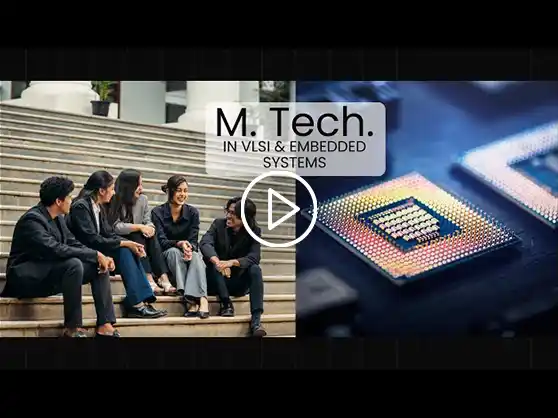Admission Enquiry
HELPLINE:
+91 99805 20483 /+91 80 4619 9143
Programs
M. Tech. in VLSI and Embedded Systems
Overview
The programme offers an industry-aligned curriculum engineered to meet the advanced demands by Integrating front-end RTL design, back-end physical design, and embedded system development, focusing on building expertise in microelectronic circuit design, ASIC / FPGA implementation and mixed signal verification.
With application-driven modules tailored for high-growth sectors such as automotive electronics, industrial automation, and medical instrumentation, the curriculum provides exposure to industry-standard EDA tools, TCAD tools and embedded platforms. Leveraging a strong blend of theoretical rigor and hands-on lab experience, the program aims to develop industry-ready engineers with competencies that are highly valued by VLSI Design and Embedded product firms.
Duration
Two Years / Four Semesters
Commence of the course
Course Duration
Two Years
Mode of Study
Eligibility
B.E. / B. Tech. with minimum 50% marks or equivalent in CGPA in relevant discipline.
A relaxation of 5% marks or its equivalent grade may be allowed for those belonging to SC / ST.
Areas of Learning
- Digital Design and HDL Programming
- VLSI Front-End Design
- VLSI Back-End (Physical Design)
- Embedded System Design
- System Integration and Co-Design
Key Features
Strategic Industry Collaborations with leading Semiconductor Pvt. Ltd., ensuring that the curriculum remains aligned with current industry needs and trends.
Global exposure through Summer Exchange Programme.
International collaboration with Youngstown State University, Ohio, USA.
Practical application with leading tools such as mentor graphics and cadence.
Seamless transition to Ph. D. programme.
Industry-integrated internships.
Program Structure
Career Opportunities
VLSI and Embedded Systems offer a wide range of dynamic career paths. Professionals can pursue roles such as Hardware Design Engineers, Design Validation and Verification Engineers, who test and verify design performance and reliability. Opportunities further include ASIC Layout Engineers responsible for designing layouts of application-specific integrated circuits, and Systems Engineers who manage the integration of complex hardware and software systems. Additionally, Device Engineers play a key role in enhancing and optimizing semiconductor device performance.
FAQ's
The M. Tech. in VLSI and Embedded Systems provides excellent scope, with strong demand for graduates in roles such as VLSI Design Engineer, ASIC Verification Engineer, Physical Design Engineer, and Embedded Systems Developer. Graduates contribute to the design of chips for AI, IoT, autonomous vehicles, and advanced consumer electronics, creating opportunities in the private and public sectors, multinational corporations, and research institutions. The field offers lucrative career paths across diverse industries, including semiconductors, telecommunications, automotive, and aerospace
The M. Tech. in VLSI and Embedded Systems is a two-year programme comprising four semesters. The curriculum is structured around state-of-the-art tools essential for navigating the dynamic landscape of VLSI and embedded systems. Industry collaborations, global exposure, practical applications with leading tools such as Mentor Graphics and Cadence, and industry-integrated internships collectively provide a seamless transition to a Ph. D. programme.
This programme delivers a tailored curriculum designed for excellence in the semiconductor industry. Covering front-end, back-end, and embedded systems, it specialises in developing skills for designing, fabricating, and testing micro- and nanoscale devices.
The programme includes subjects such as High-Speed VLSI Design, ASIC Design, Embedded Linux System Design and Development, Embedded Systems for Automotive Applications, Advanced Microprocessors and Microcontrollers, RF and MMC Circuits, Digital System Testing and Testable Design, and Hardware-Software Co-Design.
Yes. The programme provides a smooth transition to a Ph. D. or research-focused career.
Applicants must hold a B.E./B. Tech. in ECE, Electronics & Telecommunications, Electronics, or Electronics & Computer Science, with a minimum of 50% marks or equivalent CGPA in a relevant discipline. A relaxation of 5% or its equivalent grade may be allowed for candidates belonging to SC/ST categories.
Yes. The programme includes Analogue CMOS IC Design as one of the core subjects in the first semester. For detailed information, you can refer the M. Tech. in VLSI and Embedded Systems page.
Yes. Through strategic industry collaboration with Tessolve Semiconductor Pvt. Ltd., the curriculum remains closely aligned with current industry needs and trends, offering valuable exposure to real-world projects.
Yes. The programme is an excellent choice for careers in 5G chip design and autonomous systems, as it covers key aspects relevant to both areas.
Students gain practical learning experience using industry-standard tools such as Mentor Graphics and Cadence.
Admission is based on an online aptitude test followed by a personal interview conducted by Alliance University.
Yes. Alliance University offers category-based scholarships as well as merit-based scholarships through the Alliance University Scholastic Aptitude Test (AUSAT). Need-based support is also available for deserving students.
The programme’s strength lies in its strong industry collaborations, world-class Centres of Excellence, industry-integrated internships, global exposure opportunities, and expert faculty. Together, these ensure that graduates are prepared for both advanced research and successful careers in industry.
The Career Advancement and Networking (CAN) Department supports students by helping them explore career options, preparing them for interviews, and guiding them through the recruitment process. CAN organises guest lectures, corporate events, seminars, in-plant training, certificate programmes, workshops, live projects, and industry exposure visits, ensuring students are well-prepared for placement opportunities with top firms.
Graduates can take up roles such as Hardware Design Engineer, Verification Engineer, Validation Engineer, Technical Lead, R&D Engineer, ASIC Layout Engineer, Device Engineer, and Systems Engineer.
Contact for Admissions
-
 Call Us
Call Us+91 99805 20483
-
 Email Us
Email Usmtech@alliance.edu.in

